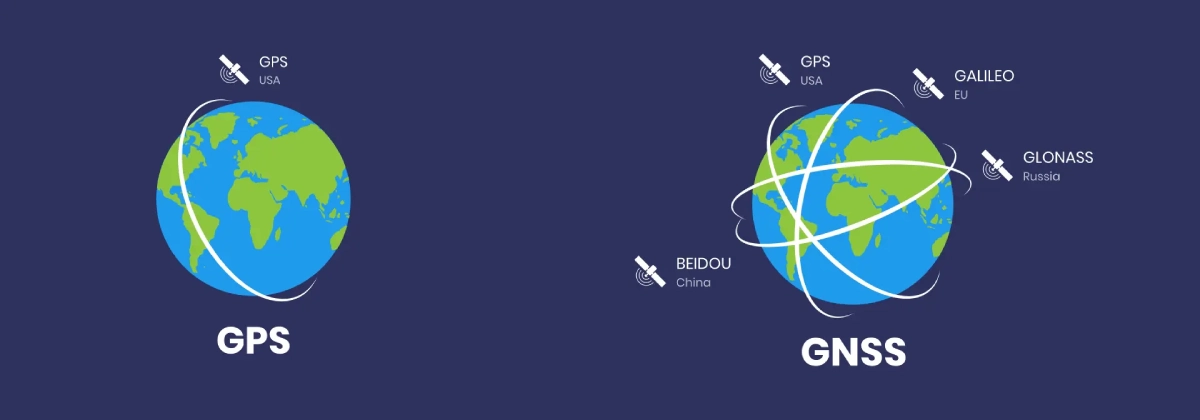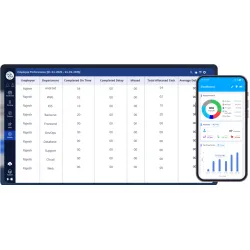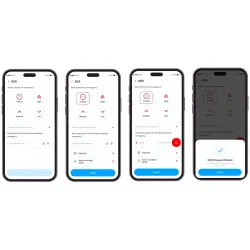
Accurate real-time tracking is no longer optional—it’s essential for fleet operations, logistics, and vehicle security. At the core of this technology is GNSS (Global Navigation Satellite System), which provides better performance than traditional GPS.
At ZARD.sa, we provide GNSS-powered tracking and dash cam solutions built for Saudi Arabia’s unique terrain, from dense cities to open deserts. In this guide, we explain how GNSS works, how it differs from GPS, and why it's the preferred solution for businesses and individuals alike.
What Is GNSS?
GNSS refers to satellite-based positioning technologies that determine a device's geographic location using signals from multiple satellite systems—not just the U.S.-based GPS.
Major GNSS Systems:
-
GPS (USA)
-
GLONASS (Russia)
-
Galileo (European Union)
-
BeiDou (China)
Unlike GPS-only devices, GNSS-enabled trackers connect to several satellite constellations, resulting in:
-
Higher accuracy (1–2 meters or better)
-
Greater signal reliability in complex environments
-
Improved performance in cities and remote areas
How GNSS Tracking Works
A GNSS device calculates its position using signals from at least four satellites. This data—such as location, speed, and time—is then transmitted over a 4G/LTE network to a tracking platform or mobile app.
GNSS tracking enables:
-
Live vehicle location monitoring
-
Trip history and route playback
-
Speed tracking and driving behavior analysis
-
Geofence alerts for zone entry/exit
-
Timestamped video recordings for dash cams
GNSS vs. GPS: Key Differences
| Feature | GPS (Global Positioning System) | GNSS (Global Navigation Satellite System) |
|---|---|---|
| Satellite Systems | 1 (USA only) | 4+ (USA, EU, China, Russia) |
| Accuracy | ~5–10 meters | 1–2 meters or better |
| Signal Coverage | Global, but less reliable | Global, more consistent |
| Performance in Cities | May be disrupted | Stronger due to multi-system support |
| Redundancy & Stability | Low | High fallback and redundancy |
GNSS provides better signal lock, faster connection, and reliable tracking—especially in the varied environments across Saudi Arabia.
Why GNSS Matters in Saudi Arabia
From congested areas like Riyadh and Jeddah to remote highways in Tabuk or Najran, satellite signal strength can vary. GPS-only trackers may struggle, while GNSS devices offer:
-
Faster satellite acquisition
-
Better performance in tunnels and dense cities
-
Reliable tracking across deserts, mountains, and highways
GNSS Devices Available at ZARD.sa
Zard W18L – 4G GNSS Tracker
Industrial-grade tracker that supports GPS, GLONASS, Galileo, and BeiDou. Ideal for fleet tracking, logistics, and vehicle recovery with full alert systems.
Zard V7 Pro – GNSS Dash Cam with LTE
A dual-channel dash cam with GNSS tracking, two-way audio, and advanced features such as ADAS and DMS. Suitable for ride-hailing fleets and business vehicles.
Zard R56L – OBD GNSS Tracker
Easy plug-in tracker with real-time location, route playback, and driving behavior alerts. Designed for personal vehicles and light commercial fleets.
Real-World Use Examples
-
Vehicle Recovery: A van fitted with the Zard W12L was recovered within 90 minutes using live GNSS location tracking.
-
Passenger Transport: A ride-hailing company reduced customer disputes by 40% with GNSS-verified video from the Zard V7 Pro.
-
Logistics Optimization: A delivery fleet improved on-time performance by 28% after analyzing route history through GNSS data.
-
Theft Prevention: A geofence alert from a GNSS tracker helped stop unauthorized movement of a fuel truck.
-
Insurance Disputes: GNSS data combined with dash cam video helped reject a false damage claim and avoid legal expenses.
Industries That Benefit from GNSS
-
Fleet Management & Logistics
-
Passenger Transport & Ride-Hailing
-
Construction & Heavy Equipment
-
Cold Chain & Temperature-Sensitive Goods
-
Insurance, Leasing & Rentals
How to Choose the Right GNSS Tracker
When selecting a GNSS device from ZARD.sa, consider:
-
Purpose: Is it for personal use, commercial use, or an entire fleet?
-
Network Compatibility: Ensure the device supports 4G or LTE.
-
Power Source: Plug-in (OBD), battery-powered, or hardwired installation.
-
Video Recording: Needed for compliance, safety, or incident analysis?
-
Software Compatibility: Devices should sync with web and mobile apps.
-
Regulatory Compliance: All ZARD trackers comply with CST and MOI standards.
Frequently Asked Questions (FAQs)
-
Is GNSS more accurate than GPS?
-
Yes. GNSS uses multiple satellite networks, resulting in better accuracy and reliability than GPS alone.
-
-
Does GNSS require internet to function?
-
No. Location is calculated using satellite signals. However, internet/data is needed for real-time updates and remote access.
-
-
Can GNSS be used for personal vehicles?
-
Yes. ZARD.sa offers personal-use GNSS trackers that are easy to install and affordable.
-
-
Are GNSS trackers legal in Saudi Arabia?
-
Yes. All devices offered on ZARD.sa are certified by the Communications, Space & Technology Commission (CST) and the Ministry of Interior.
-
-
Is installation complicated?
-
Many GNSS devices are plug-and-play. More advanced models may require hardwiring to enable features like tamper detection or 24/7 monitoring.
-
-
Can GNSS trackers detect harsh driving behavior?
-
Yes. Many GNSS trackers from ZARD.sa include sensors that monitor acceleration, hard braking, and sharp turns.
-
-
What happens if a GNSS device loses signal?
-
Devices with multi-constellation GNSS resume tracking automatically and maintain more reliable connections in difficult environments.
-
-
Do GNSS trackers support geofencing?
-
Yes. You can set up geofences to get instant alerts when a vehicle enters or exits a predefined area.
-
-
Can I receive real-time alerts from a GNSS tracker?
-
Yes. ZARD's platform supports instant alerts via SMS, email, or mobile notifications for various events.
-
-
Can GNSS trackers integrate with third-party platforms?
-
Many GNSS devices are compatible with other fleet management systems and allow integration through APIs or export features.
-
Conclusion
GNSS offers unmatched precision and stability, making it the best solution for modern vehicle tracking across Saudi Arabia. Whether you're tracking a fleet, protecting personal assets, or managing deliveries, GNSS ensures faster response, better coverage, and peace of mind.
At ZARD.sa, we offer a wide range of certified GNSS devices—from OBD trackers to full dash cam systems—designed for Saudi roads, regulations, and business needs.
Discover advanced GNSS tracking today at ZARD.sa and take control of your fleet or vehicle with confidence.


